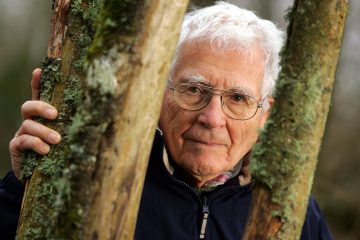James Lovelock, a name that reverberates through the annals of modern science, has left an indelible mark on our understanding of the intricate tapestry of Earth’s ecosystems. As a maverick thinker and visionary environmentalist, Lovelock’s accomplishments stand as testaments to his lifelong dedication to unraveling the mysteries of our planet. Join us on a journey through the wondrous achievements of this pioneering scientist, as we delve into the profound impact he has had on shaping our perception of the world we inhabit.
Table of Contents
- James Lovelock’s Pioneering Work in Gaia Theory
- Exploring Lovelock’s Impact on Environmental Science
- Innovations and Contributions of James Lovelock in Climate Research
- Shaping the Future: Lessons to Learn from James Lovelock’s Legacy
- Q&A
- To Wrap It Up

James Lovelock’s Pioneering Work in Gaia Theory
James Lovelock’s groundbreaking contributions to Gaia theory have reshaped our understanding of the Earth as a self-regulating system. His work delves deep into the interconnectedness of all living organisms and their environments, revealing a complex web of interactions that sustain life on our planet. Through his research, Lovelock has highlighted the importance of viewing Earth as a single, cohesive entity where biological, chemical, and physical processes work in harmony to maintain the conditions necessary for life to thrive.
One of the key insights from Lovelock’s work is the concept of feedback loops within the Earth system, illustrating how various components of the environment interact and influence one another. This holistic perspective has inspired new ways of thinking about ecological balance and sustainability, emphasizing the delicate balance that must be maintained to support life on Earth. By recognizing the Earth as a living, dynamic entity, Lovelock’s work prompts us to reevaluate our relationship with the planet and the collective responsibility we bear in preserving its intricate ecosystems for future generations.
Exploring Lovelock’s Impact on Environmental Science
James Lovelock’s groundbreaking discoveries have left an indelible mark on the field of environmental science. His development of the Gaia hypothesis revolutionized our understanding of Earth as a self-regulating organism, where the biosphere and physical components work together to maintain the conditions necessary for life.
Through his insightful research and innovative thinking, Lovelock has inspired a new generation of environmentalists and scientists to view the planet as a complex, interconnected system that requires careful stewardship. His contributions have paved the way for critical discussions on climate change, biodiversity loss, and sustainable development, shaping the future of environmental science and conservation efforts.

Innovations and Contributions of James Lovelock in Climate Research
James Lovelock, a visionary scientist, has made substantial contributions to climate research through his groundbreaking innovations. One of his most notable achievements is the development of the Gaia hypothesis, which proposes that the Earth is a self-regulating system. This groundbreaking concept revolutionized our understanding of the planet as a living, interconnected entity, influencing the way we approach environmental issues.
In addition to his theoretical contributions, Lovelock’s practical innovations have also left a lasting impact on climate science. His invention of the electron capture detector played a crucial role in detecting pollutants in the atmosphere, leading to significant advancements in environmental monitoring. Lovelock’s multidisciplinary approach and relentless pursuit of knowledge have paved the way for new insights into the complex interactions shaping our planet’s climate.

Shaping the Future: Lessons to Learn from James Lovelock’s Legacy
James Lovelock’s legacy serves as a beacon of inspiration for those aiming to make a lasting impact on the world. His groundbreaking Gaia hypothesis revolutionized our understanding of Earth as a self-regulating organism, highlighting the interconnectedness of all living things. This paradigm shift continues to influence ecological studies and sustainability efforts worldwide.
One of Lovelock’s notable accomplishments is the development of the electron capture detector, a device pivotal in detecting pollutants in the environment. This invention was a game-changer in the realm of environmental monitoring, laying the foundation for modern environmental science practices. Lovelock’s innovative spirit and dedication to advancing environmental awareness remind us of the importance of proactive measures in preserving our planet for future generations.
Q&A
Q: Who is James Lovelock and why is he a prominent figure in the scientific community?
A: James Lovelock is a renowned British scientist, environmentalist, and futurist best known for proposing the Gaia hypothesis. His groundbreaking theory suggests that the Earth functions as a self-regulating system, similar to a living organism. Lovelock’s work has had a significant impact on the fields of ecology, climate science, and sustainability.
Q: What are some of James Lovelock’s notable accomplishments?
A: James Lovelock’s accomplishments are diverse and impactful. He invented the electron capture detector, a revolutionary device used to detect trace amounts of various chemicals in the atmosphere, which was crucial in the detection of CFCs that led to the discovery of the ozone hole. Lovelock’s Gaia hypothesis challenged traditional scientific thinking and sparked new discussions on the interconnectedness of Earth’s systems.
Q: How has James Lovelock influenced environmental awareness and policy?
A: James Lovelock’s work has played a significant role in raising awareness about the interconnectedness of natural systems and the importance of preserving the Earth’s delicate balance. His advocacy for sustainability and environmental protection has influenced policymakers, scientists, and activists worldwide, shaping discussions on climate change and biodiversity conservation.
To Wrap It Up
As we conclude our exploration of James Lovelock’s remarkable accomplishments, we are reminded of the profound impact his work has had on our understanding of the interconnectedness of life on Earth. From the groundbreaking Gaia hypothesis to his pioneering research in environmental science, Lovelock’s legacy is a testament to the power of visionary thinking and relentless curiosity. As we look to the future, let us draw inspiration from Lovelock’s innovative spirit and continue to strive for a harmonious relationship with our planet. May his contributions serve as a beacon of hope and a call to action for generations to come.



0 Comments